外研版九年级下册英语时态综合讲解与巩固训练(附时态图表)
文档属性
| 名称 | 外研版九年级下册英语时态综合讲解与巩固训练(附时态图表) |
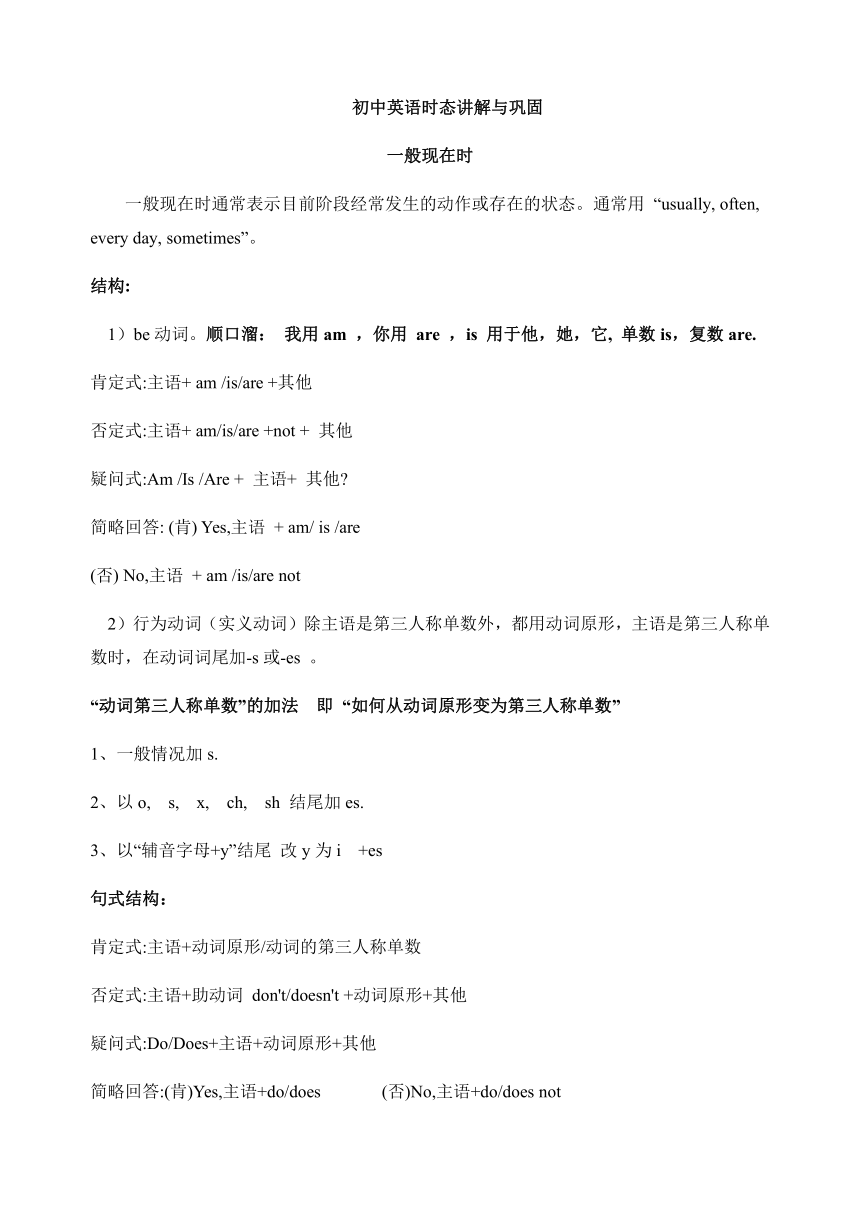
|
|
| 格式 | zip | ||
| 文件大小 | 133.5KB | ||
| 资源类型 | 教案 | ||
| 版本资源 | 外研版 | ||
| 科目 | 英语 | ||
| 更新时间 | 2020-02-06 00:00:00 | ||
图片预览

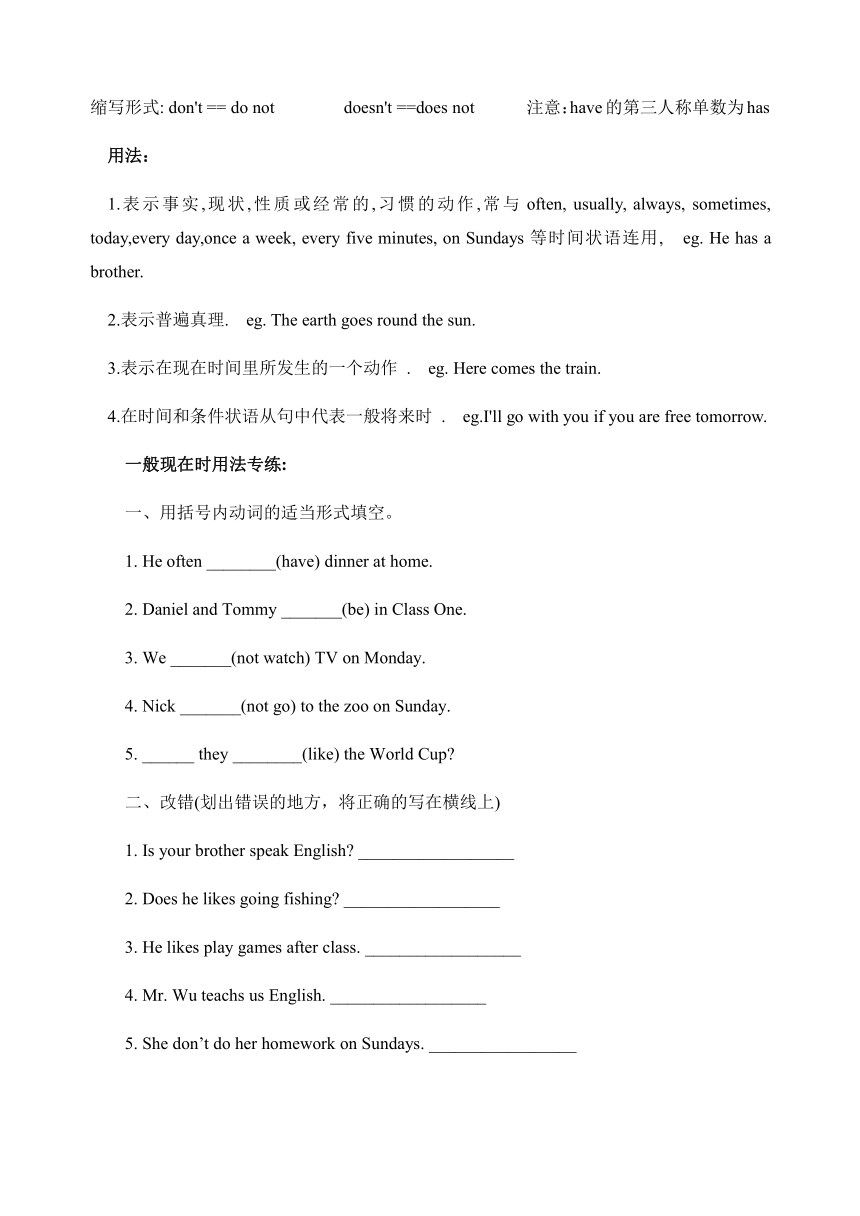
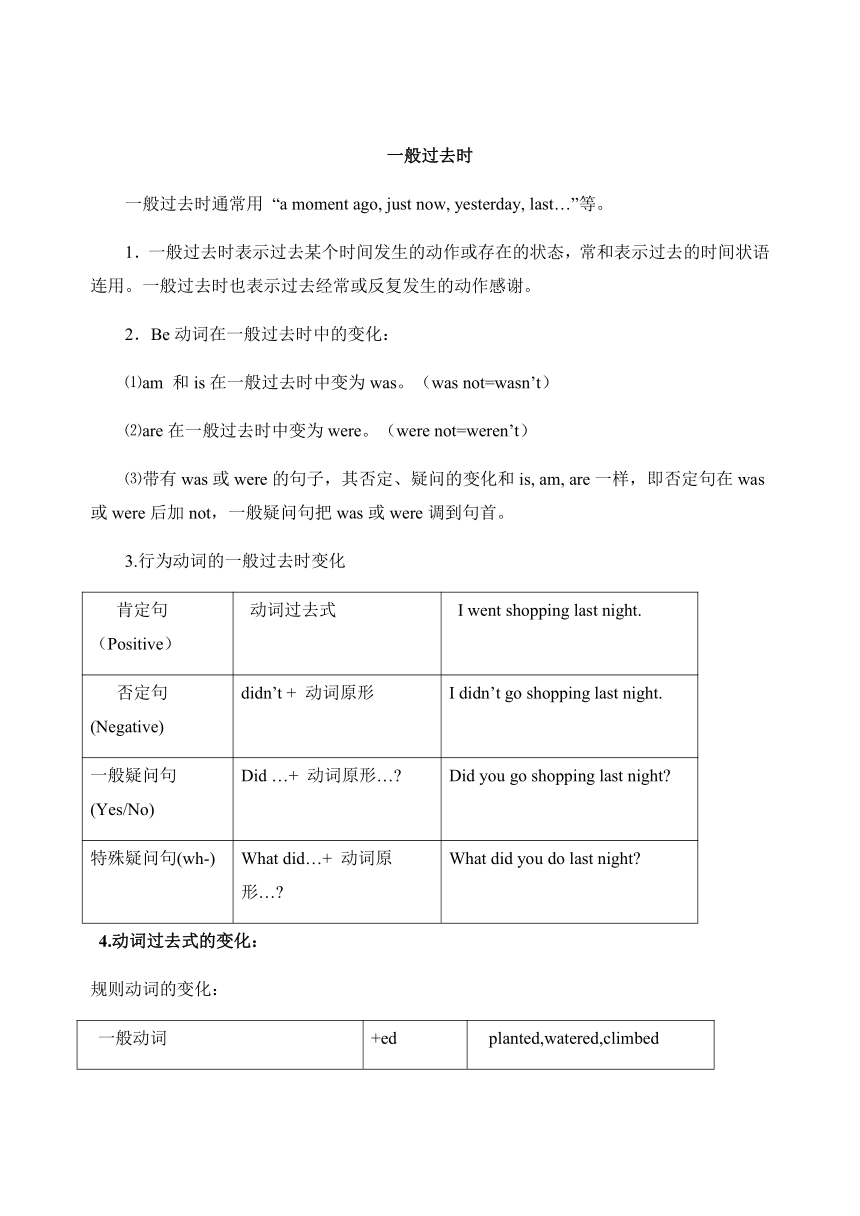
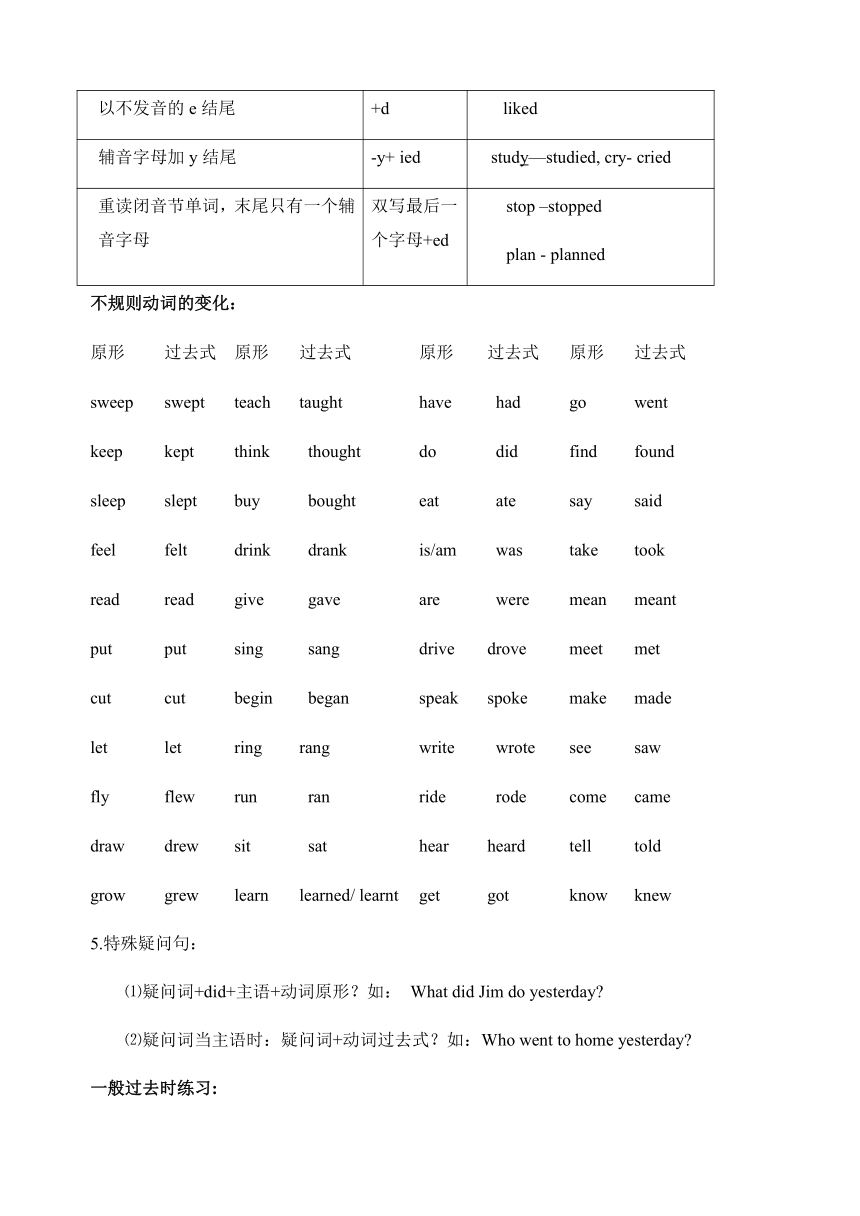
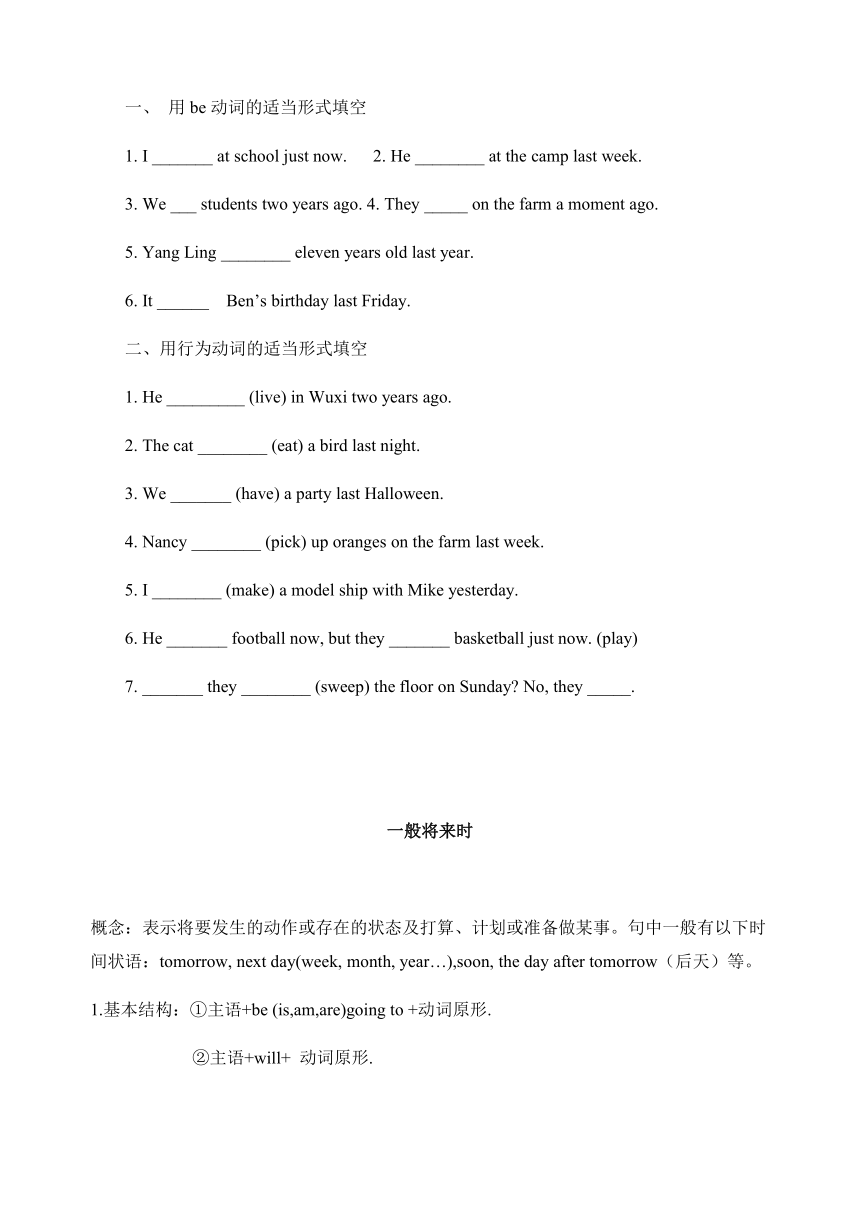
文档简介
初中英语时态讲解与巩固
一般现在时
一般现在时通常表示目前阶段经常发生的动作或存在的状态。通常用 “usually, often, every day, sometimes”。
结构:
1)be动词。顺口溜: 我用am ,你用 are ,is 用于他,她,它, 单数is,复数are.
肯定式:主语+ am /is/are +其他
否定式:主语+ am/is/are +not + 其他
疑问式:Am /Is /Are + 主语+ 其他?
简略回答: (肯) Yes,主语 + am/ is /are
(否) No,主语 + am /is/are not
2)行为动词(实义动词)除主语是第三人称单数外,都用动词原形,主语是第三人称单数时,在动词词尾加-s或-es 。
“动词第三人称单数”的加法 即 “如何从动词原形变为第三人称单数”
1、一般情况加s.
2、以o, s, x, ch, sh 结尾加es.
3、以“辅音字母+y”结尾 改y为i +es
句式结构:
肯定式:主语+动词原形/动词的第三人称单数
否定式:主语+助动词 don't/doesn't +动词原形+其他
疑问式:Do/Does+主语+动词原形+其他
简略回答:(肯)Yes,主语+do/does (否)No,主语+do/does not
缩写形式: don't == do not doesn't ==does not 注意:have的第三人称单数为has
用法:
1.表示事实,现状,性质或经常的,习惯的动作,常与often, usually, always, sometimes, today,every day,once a week, every five minutes, on Sundays等时间状语连用, eg. He has a brother.
2.表示普遍真理. eg. The earth goes round the sun.
3.表示在现在时间里所发生的一个动作 . eg. Here comes the train.
4.在时间和条件状语从句中代表一般将来时 . eg.I'll go with you if you are free tomorrow.
一般现在时用法专练:
一、用括号内动词的适当形式填空。
1. He often ________(have) dinner at home.
2. Daniel and Tommy _______(be) in Class One.
3. We _______(not watch) TV on Monday.
4. Nick _______(not go) to the zoo on Sunday.
5. ______ they ________(like) the World Cup?
二、改错(划出错误的地方,将正确的写在横线上)
1. Is your brother speak English? __________________
2. Does he likes going fishing? __________________
3. He likes play games after class. __________________
4. Mr. Wu teachs us English. __________________
5. She don’t do her homework on Sundays. _________________
一般过去时
一般过去时通常用 “a moment ago, just now, yesterday, last…”等。
1.一般过去时表示过去某个时间发生的动作或存在的状态,常和表示过去的时间状语连用。一般过去时也表示过去经常或反复发生的动作感谢。
2.Be动词在一般过去时中的变化:
⑴am 和is在一般过去时中变为was。(was not=wasn’t)
⑵are在一般过去时中变为were。(were not=weren’t)
⑶带有was或were的句子,其否定、疑问的变化和is, am, are一样,即否定句在was或were后加not,一般疑问句把was或were调到句首。
3.行为动词的一般过去时变化
肯定句(Positive) 动词过去式 I went shopping last night.
否定句(Negative) didn’t + 动词原形 I didn’t go shopping last night.
一般疑问句(Yes/No) Did …+ 动词原形…? Did you go shopping last night?
特殊疑问句(wh-) What did…+ 动词原形…? What did you do last night?
4.动词过去式的变化:
规则动词的变化:
一般动词 +ed planted,watered,climbed
以不发音的e结尾 +d liked
辅音字母加y结尾 -y+ ied study—studied, cry- cried
重读闭音节单词,末尾只有一个辅音字母 双写最后一个字母+ed stop –stoppedplan - planned
不规则动词的变化:
原形 过去式 原形 过去式 原形 过去式 原形 过去式
sweep swept teach taught have had go went
keep kept think thought do did find found
sleep slept buy bought eat ate say said
feel felt drink drank is/am was take took
read read give gave are were mean meant
put put sing sang drive drove meet met
cut cut begin began speak spoke make made
let let ring rang write wrote see saw
fly flew run ran ride rode come came
draw drew sit sat hear heard tell told
grow grew learn learned/ learnt get got know knew
5.特殊疑问句:
⑴疑问词+did+主语+动词原形?如: What did Jim do yesterday?
⑵疑问词当主语时:疑问词+动词过去式?如:Who went to home yesterday?
一般过去时练习:
一、 用be动词的适当形式填空
1. I _______ at school just now. 2. He ________ at the camp last week.
3. We ___ students two years ago. 4. They _____ on the farm a moment ago.
5. Yang Ling ________ eleven years old last year.
6. It ______ Ben’s birthday last Friday.
二、用行为动词的适当形式填空
1. He _________ (live) in Wuxi two years ago.
2. The cat ________ (eat) a bird last night.
3. We _______ (have) a party last Halloween.
4. Nancy ________ (pick) up oranges on the farm last week.
5. I ________ (make) a model ship with Mike yesterday.
6. He _______ football now, but they _______ basketball just now. (play)
7. _______ they ________ (sweep) the floor on Sunday? No, they _____.
一般将来时
概念:表示将要发生的动作或存在的状态及打算、计划或准备做某事。句中一般有以下时间状语:tomorrow, next day(week, month, year…),soon, the day after tomorrow(后天)等。
1.基本结构:①主语+be (is,am,are)going to +动词原形.
②主语+will+ 动词原形.
2.否定句: ①主语+be (is,am,are)+not +going to +动词原形.
②主语+will +not(won’t)+ 动词原形.
例如:I’m going to have a picnic this afternoon.→
I’m not going to have a picnic this afternoon.
3.一般疑问句:①Is(Are)+主语 +going to +动词原形.+? ②Will+主语+动词原形+?
例:We are going to go on an outing this weekend.
→ Are you going to go on an outing this weekend? Yes,we are. No, we aren’t.
Will he go to Beijing next week? Yes,he will. No,he won’t.
4.对划线部分提问。一般情况,一般将来时的对划线部分有三种情况。
1). 问人。Who 例如:I’m going to New York soon. →Who’s going to New York soon.
2). 问干什么。What … do.例如: My father is going to watch a race with me this afternoon. →What is your father going to do with you this afternoon.
3). 问什么时候。When.例如:She’s going to go to bed at nine. →When is she going to bed?
5同义句:be going to = will I am going to go swimming tomorrow(明天). = I will go swimming tomorrow.
一、练习:填空
1. 我打算明天和朋友去野炊。 I_____ _______ _________ have a picnic with my friends. I ________ have a picnic with my friends.
2. 下个星期一你打算去干嘛? 我想去打篮球。 What ________ ________ _________ _________ _________ next Monday? I _______ ______ _____ play basketball. What _________ you do next Monday? I ________ play basketball.
3. 你妈妈这个周末去购物吗?是,她要去买一些水果。 _____ your mother _______ ________ go shopping this ___________? Yes, she _________. She ______ ________ __________ buy some fruit.
4. 你们打算什么时候见面。 What time _______ you _________ __________ meet?
现在进行时
通常用“now/look/listen”.
1.现在进行时表示现在正在进行或发生的动作,也可表示当前一段时间内的活动或现阶段正在进行的动作。
2.现在进行时的结构:.
肯定句 : 主语+be(is,am,are ) +动词现在分词-ing
eg: I am(not) doing my homework. You/We/They are(not) reading.
否定句:主语+be(is,am,are )+not + 动词现在分词-ing
一般疑问句:Is(Are)+主语+动词现在分词-ing?
特殊疑问:疑问词+ be + 主语 + 动词ing?
3.动词加ing的变化规则
1)一般情况下,直接加ing,如:cook-cooking
2)以不发音的e结尾,去e加ing,如:make-making, taste-tasting
3)如末尾是一个元音字母和一个辅音字母,双写末尾的辅音字母,再加ing,
如:run-running, stop-stopping,swim—swimming
4.?现在进行时专项练习:用所给的动词的正确形式填空:
1.The boy __________________ ( draw)a picture now.
2. Listen .Some girls _______________ ( sing)in the classroom .
3. My mother _________________ ( cook )some nice food now.
4. What _____ you ______ ( do ) now?
5. Look . They _______________( have) an English lesson .
6.______Helen____________(wash )clothes? Yes ,she is .
过去进行时
句式结构:
肯定句:主语+助动词be (was,were)+动词现在分词-ing+其它
否定句:主语+助动词be (was,were)+not+动词现在分词-ing+其它
一般疑问句:Was(Were)+主语+动词现在分词-ing+其它?
特殊疑问句:疑问词+was(were)+动词现在分词-ing+其它?
用法:
1、 表示在过去某一时间正在进行的动作,往往有表示过去的时间状语then, at that time, this time yesterday等,或与过去发生的某事同时发生的动作(即与when, while引出的时间状语从句连用)。
例:They were talking about a film at six yesterday evening. 昨晚6点他们正在谈论一部电影。
What were you doing at this time last week? 上周的这个时候你在干什么?
When the teacher came in, they were talking. 老师进来时,他们在讲话。
2、 表示在过去某一段时间内进行的动作。
例:They were swimming from two to three yesterday afternoon.
She was watching TV the whole morning.
3、 表示过去将要发生的动作。
例:He said he was leaving on Tuesday. 他说他周二动身。
Tom said he was going tomorrow. 汤姆说他明天去。
过去进行时练习题:
一、动词填空。
1.John_______(work) all day yesterday.
2. —What______you _______(do) at ten o'clock yesterday﹖
—I_______(study) in class.
3.When Harry _______(have) breakfast Lily _______(telephone) him.
4.When I ________ (go) to school this morning I ______ (see) a car running into a bus.
6. This time yesterday Jack ______ (mend) his bike.
7. I ______ (write) a letter at ten last night.
8. It was six. The Greens ______ (have) supper.
9. When you _____(knock) at the door yesterday,I ______ (do) some washing.
10. While my mother ______ (watch) TV, I ______(make) a kite.
现在完成时
句式构成:肯定句:主语+助动词have(has)+动词过去分词-ed
否定句:主语+助动词have(has)+not(haven’t,hasn’t)+动词过去分词-ed
一般疑问句:Have(Has)+ 主语+动词过去分词-ed+?
特殊疑问句:疑问词+have(has)+ 主语+动词过去分词-ed+?
用法:
1、 表示说话之前已完成的动作,而且这个动作的结果对现在是情况仍有影响。常被just,already,yet 等副词修饰。
Mr. Wang has just come back from America. 王先生刚从美国回来。
2.现在完成时还可用来表示过去发生的动作一直延续到现在,常带有for或since 等表示一段时间的状语。
如:Mr Wang has lived here since 1983.
3.现在完成时瞬间动词即终止性动词不能与表示一段时间的状语连用。
常见终止性动词与延续性动词 (或状态动词) 的对应关系如下:
come / go / arrive / get / reach / move--- be in/at
open --- be open die --- be dead
close --- be closed become ---be
borrow --- keep put on --- wear
buy --- have leave ----- be away (from)
begin / start ----- be on fall asleep ---- be asleep
end/finish ----- be over catch a cold ----- have a cold
join the army ---- be in the army, be a soldier
join the Party---- be in the Party , be a Party member
例:吉姆买这支已有两年了。
Jim bought this pen two years ago.
Jim has had this pen for two years.
Jim has had this pen since two years ago.
Jim has had this pen since 2007
It is two years since Jim bought this pen.
4.在表示“最近几世纪/ 年/ 月以来……”时间状语中,谓语动词用现在完成时。
in the past few years/months/weeks/days;over the past few years; during the last three months; for the last few centuries, through centuries; throughout history 等
5.表示“第几次做某事,”或在 “It is the best (worst, most interesting ) +名词 +that” 后面跟现在完成时。
例:This is my first time that I have visited China.
This is the most interesting film I have ever seen.
That is the only book that he has written.
6. have / has been to + 地点 意为“曾去过某地”,暗含目前已不在该地,仅表示当事人的一种经历而已。
have / has gone to + 地点 “到了某地去了”,暗含“已离开原地去了某地”之意,但是否到达了某地尚不确定。
如:He has gone to Shanghai. 他去了上海。 He has been to Shanghai. 他去过了上海。
1、Miss Green isn't in the office . she_______ to the library .
A.has gone B. went C.will go D. has been
2、My parents ______ Shandong for ten years .
A. have been in B. have been to C. have gone to D. have been
3、The students have cleaned the classroom, ?
A. so they B. don’t they C. have they D. haven’t they
4、 His uncle for more than 9 years.
A. has come here B. has started to work C. has lived there D. has left the university
时态分类练习
一般现在时与现在进行时专练
( ) 1. Father usually ______ his newspaper after dinner.
A. read B. reads C. reading D. is reading
( ) 2. The Blacks often ______ to the cinema on Saturday evenings.
A. go B. goes C. is going D. are going
( ) 3.Look! The boy ______ with his mother in the pool.
A. is swimming B. is swimming C. are swimming D. are swiming
( ) 4.--- What is Tom doing in the classroom? --- He ______ something on the blackboard.
A. draws B. draw C. is drawing D. are drawing.
( ) 5.Old Tom usually ______ up at six and ______ sports in the garden.
A. gets, dos B. gets, does C. get, does D. gets, do
( ) 6. It’s ten o’clock and Jack ______ still(仍然) ______ his homework.
A. is, do B. is, doing C. are, do D. are, doing
( ) 7. The waiters ______ to work at five every morning.
A. start B. starts C. starting D. are starting
( ) 8.I ______ a letter, so I can’t go out with you.
A. is writing B. am writing C. am writeing D. am writting
( )9.A hundred days _____ quite a long time.
A. is B. are C. have D. has
( )10. --______ late for the meeting next time. –Sorry, I won’t.
A. Don’t B. Don’t be C. Won’t be D. Be not
( )11. My mother _____ noodles, but my father ______.
A. likes, doesn’t B. don’t like, do C. likes, didn’t D. didn’t like, do
( )12. The picture ______ nice.
A. looks B. is looked C. look D. is looking
( )13. The students will go to the Summer Palace if it ______ tomorrow.
A. don’t rain B. doesn’t rain C. won’t rain D. isn’t rain
( )14. We are always ready _______ others.
A. to helping B. to help C. help D. helping
( )15. I often hear her ______ about the boy.
A. talking B. talk C. to talk D. talked
( )16. He’s already a little weak in Chinese, ______ he ?
A. is B. isn’t C. has D. hasn’t
( )17.Potatoes are ______ in the field by the farmers.
A. grow B. growing C. grown D. grew
( )18. Does she have a watch? – Yes, she ______.
A. have B. do C. has D. does
( )19. She _____ English very much now.
A. is liking B. likes C. liked D. is teaching
( )20. She has no paper to _____ . Why not give her some?
A. write B. be writing C. write on D. write in
( )21. Does Mr Know-all know ______ keys?
A. to make B. how to make C. how make D. making
( )22. Does your mother ______ English now?
A. teaches B. teach C. taught D. is teaching
( )23. Jack usually ______ mistakes last term. But this term he does better.
A. makes B. made C. does D. did
( )24. The boy is too young, please ______ carefully.
A. look after him B. look him after C. look at him D. look him at
( )25. She ______ you to come to my birthday party.
A. hopes B. wishes C. want D. lets
( )26. --Where is Frank now? -- He ______ his bike in the yard.
A. fixes up B. fixing up C. is fixing up D. fixed
( )27. Bob often ______ his mother with the housework on Sundays.
A. help B. helping C. helps D. helped
( )28. The students will go to the Summer Palace if it ______ tomorrow.
A. don’t rain B. doesn’t rain C. won’t rain D. isn’t rain
( )29. If it _____ tomorrow, I will go by car.
A. rain B. will rain C. rains D. would rain
( )30. --What a nice garden! –She ______ it every day.
A. is cleaning B. has cleaned C. cleans D. clean
( )31. --Where is Peter? -- He ______ his homework in the room.
A. is doing B. does C. did D. do
( )32. The teacher told us that light ______ much faster than sound.
A. travels B. traveled C. was D. will be
( )33. My mother told us that Taiwan ______ part of China.
A. is B. are C. was D. were
( )34. Do you know bananas _____ in Hainan?
A. grows B. is grown C. grew D. are grown
( )35. The clothes ______very soft.
A. are felt B. are feeling C. feel D. feels
( )36. The supermarket is far from Mary’s house. So she _____ only once a week.
A. goes shopping B. has been there C. was shopping D. has gone there
( )37. Don’t make so much noise. We _____ to the music.
A. are listening B. listen C. listened D. have listened
( )38. I’ll go swimming with you if I _____ free tomorrow.
A. will be B. shall be C. am D. was
( )39. – Oh, Mrs. King, your sweater looks nice. Is it _____ wool ?
-- Yes, and it’s _____ Inner Mongolia.
A. made of, made by B. made of, made in
C. made by, made for D. made by, made from
一般过去时专练
( )1. The mother asked the boy _______ down the ladder, but he went on _______ instead.
A. come; climbing B. to come; to climb
C. to come; climbing D. coming; climbing
( )2. The teacher asked the students to close the windows _______ the wind from _______ the papers away.
A. to stop; blowing B. stopping; blowing
C. to stop; blow D. stopped; blow
( )3. The sick man stayed in bed, _______ very terrible.
A. felt B. feeling C. is feeling D. was feeling
( )4. Yesterday I heard a story _______ by my friend.
A. told B. telling C. to tell D. tell
( )5. The boy was made _______ there for an hour by his father.
A. standing B. stand C. to stand D. stands
( )6. I saw him _______ into the small store.
A. went B. going C. to go D. has gone
( )7. He raised his voice to make everybody in the room ______ him clearly.
A. hear B. to hear C. hearing D. heard
( )8. Our geography teacher told us yesterday that the earth _______ around the sun.
A. was moving B. moved C. has moved D. moves
( )9. Oh, it’s you. I’m sorry I _______ know you _______ here.
A. don’t; are B. didn’t; are C. didn’t; were D. don’t; were
( )10. Mr LuXun died in 1936. He _______ a lot of famous novels.
A. wrote B. was writing C. has written D. would write
( )11. --- How was your weekend on the farm?
--- Great! We _______ with the farmers.
A. enjoy ourselves B. went fishing C. will work D. make friends
( )12. --- What did Mr Jones do before he moved here?
--- He _______ a city bus for over twenty-five years.
A. is driving B. drove C. has driven D. drives
( )13. Jane _______ a new dress every month when she was in Shanghai.
A. buys B. is buying C. bought D. will buy
( )14. --- Liu Mei can’t come tonight.
--- Why? But she _______ me she would come.
A. tells B. told C. is told D. had told
( )15. He turned off the light and then _______.
A. leaves B. has left C. will leave D. left
一般将来时专练
( )1. Her hope _______ the 2008 Olympic Games.
A. to take part in B. is to take part in C. taking part in D. will take part in
( )2. --- Can I go to Beijing for my holiday, Dad? --- You can when you _______ a bit older.
A. will get B. get C. are getting D. got
( )3. If he _______harder, he will catch up with us soon.
A. study B. studies C. will study D. studied
( )4. --- Don’t forget to ask him to write to me.
--- I won’t. As soon as he _______, I’ll ask him to write to you.
A. will come B. came C. comes D. is coming
( )5. --- Jimmy is leaving for a holiday.
--- Really? Where _______ he _______?
A. has; gone B. will; go C. did; go D. would; go
( )6. Frank _______ to see his grandma if he _______ free tomorrow.
A. will come; will be B. comes; is
C. will come; is D. comes; will be
( )7. There _______ a talk on science in our school next Monday.
A. will give B. will be C. is going to give D. is
( )8. --- Shall we go shopping now?
--- Sorry, I can’t. I _______ my shirts.
A. wash B. washes C. washed D. am washing
( )9. I believe that those mountains _______ with trees in a few years’ time.
A. are covered B. will be covered C. are covering D. will cover
( )10. It is said that about 400 cars _______ in the factory next month.
A. were produced B. will produce C. are produced D. will be produced
( )11. --- Are you free this afternoon?
--- No. I’ll have an English composition _______ this afternoon.
A. to write B. wrote C. to be writing D. to be written
( )12. --- Come back home every month. --- I _______.
A. will B. must C. should D. can
( )13. A robot _______ think of itself; it _______ be told what to do.
A. can’t; must B. couldn’t; can C. may not; will D. mustn’t, may
过去进行时
专练一
一、用动词的适当形式填空。
1. While we __________ (wait) for the bus, a girl __________ (run) up to us.
2. I __________ (telephone) a friend when Bob __________ (come) in.
3. Jim __________ (jump) on the bus as it __________ (move) away.
4. We __________ (test) the new machine when the electricity __________ (go) off.
5. She __________ (not want) to stay in bed while the others ________________ (all, work) in the fields.
6. While mother ________ (put) Cathy to bed, the door bell ________ (ring).
7. As I __________ (walk) in the park, it __________ (begin) to rain.
8. Even when she ___________ (be) a child she _____ _____ (already, think) of becoming a ballerina (芭蕾舞演员).
9. It was quite late at night. George __________ (read) and Amy __________ (ply) her needle when they __________ (hear) a knock at the door.
10. There __________ (be) a group round the fire when they __________ (reach) it. An old woman __________ (sit) on the ground near the kettle; two small children __________ (lie) near her; a donkey __________ (bend) his head over a tall girl.
专练二
1. I _____ (have) my breakfast at half past six yesterday morning.
2. Mary _____ (go) over her lessons from six to seven last night. John and peter ____(do) the same thing.
3. What _____ you ___ (do) at that time??? We _____ (watch) TV.
4. Was your father at home yesterday evening? Yes, he was. He _____ (listen) to the radio.
5. They _____(not make) a model ship when I saw him.
6. _____ they ____ (have) a meeting at 4 yesterday afternoon?
No, they _____. They _____ (clean) the classroom.
7. ______ it ______(rain) when you left school?? Yes, it ____. (No, it ____)
8. What _____ your father _____ (do) when he was your age?
9. One day, Edison _____ (wait) for a train to arrive, and suddenly a little boy ran to the track(轨道) to play.
10. He asked me if I ______ (go) fishing that afternoon.
11. The three of them were in a hurry because their plane _____ (leave) in five minutes.
12. In a letter, john told us that he _____ (come) to china next month.
13. When the bell rang, jenny _____ (wait) in her seat.
14. She _____ (make) her dress the whole afternoon.
15. While my father ____ (look) through the evening paper, he suddenly ____ a cry.
现在完成时练习
一、 Fill in the blanks with the proper form.
1. I____ already ____ (see) the film. I ________ (see) it last week.
2. _____ he ____ (finish) his work today? Not yet.
3. My father ____ just ____ (come) back from work. He is tired now.
4. Where’s Li Ming ? He __________ (go) to the teacher’s office.
5. I __________ (work) here since I ______ (move) here in 1999.
6. So far I _______________(make) quite a few friends here.
7. How long ________ the Wangs ______________(stay) here ? For two weeks.
8. I ________ just ___________ (finish) my homework.
9. He ________ (go) to school on foot every day.
10.____ you ______ (find) your science book yet?
11. If it ____ (be) fine tomorrow, I'll go with you.
12. The students ____________ (read) English when the teacher came in.
13. Look! The monkey __________ (climb) the tree.
14. My mother __________ (come) to see me next Sunday.
15. I've lost my pen. _________ you ________ (see) it anywhere?
二、Choose the best answer.
1. How long have you _______ here?
A. come B. got C. arrived D. been
2. My grandpa died _________.
A. at the age of my 2 B. for 2 years
C. when I was 2. D. my age was 6.
3. Jane has _____ to BeiJing. She will come back tomorrow.
A. been B. gone C. went D. never been
4. It is ten years _____ I last saw her.
A. after B. since C. for D. that
5.--Who will go to the station to meet Lorry?
--I will. I _____ her several times.
A. met B. have met C. had met D. will meet
6. --What a nice dress! How long _____ you _____ it?
--Just 2 weeks.
A. will, buy B. did, buy C. are, having D. have, had
7.--Do you know Lydia very well?
--Yes, She and I _____ friends since we were very young.
A. have made B. have become C. have been D. have turned
8. The Smiths _______ in China for 8 years.
A. has lived B. lived C. have been D. live
9. --Hello, this is Mr. Green speaking. Can I speak to Mr. Black?
-- Sorry. He ______ the Bainiao Park.
A. has been to B. has gone to C. went to D. will go to
10. --____ you ever ____ to the US?
-- Yes, twice.
A. Have, gone B. Have, been C, Do, go D. were, going
三、Use “never, ever, already, just, yet, for, since” to fill in the blanks.
1. I have _______ seen him before, so I have no idea about him.
2. Jack has _________ finished his homework.
3. Mr. Wang has taught in this school ________ ten years.
4. “Have you ________ seen the film?” “No, I have ________ seen it.”
5. “Has the bus left _______?” “Yes, it has _________ left.”
附:拓展:过去完成时练习题
( )(1)The police found that the house _______and a lot of things_________.
A. has broken into, has been stolen B. had broken into, had been stolen
C. has been broken into, stolen D. had been broken into, stolen
( )(2)By the end of this century, we__ ours into a strong modern country.
A. will build B. had built C. have built D. will have built
( )(3)We _________the work by six yesterday evening.
A. finished B.would finish C. had finished D. had been finished
( )(4)I _________to help you but couldn’t get here in time.
A. want B. had wanted C. have wanted D. was wanting
( )(5) Mrs. Wu told me that her sister___________.
A. left about two hours before B. would leave about two hours before
C. has left about two hours ago D. had left about two hours before
( ) (6)When I reached home, my parents __________their supper.
A.are having B.have already had
C.have had D. had already had
( ) (7)It seems that the old man _________something important.
A.has lost B. had lost C. lost D. would lose
( ) (8)She __________in this school ________the past ten years.
A.was teaching, since B. had been teaching, since
C.would teach, for D. has been teaching, for
( ) (9)Did you see Xiao Li at the party? No, ______by the time I arrived.
A.she’d left B.she's left C. She was left D.she must leave
( )(10)The job proved to be much more difficult than I______.
A. expect B.expected C. would expect D.had expected
( ) (11)We couldn’t catch up with the others because they _____too long before us.
A.started B.were starting C.have started D.had started
( ) (12)She felt anxious about her son as she ________for quite a long time.
A.haven't heard him B. hadn’t heard him
C.haven‘t heard from him D. hadn’t heard from him
( ) (13)By the time the speaker entered the hall, all the listeners_______.
A. had seated B. were seated C. seated D. were seating
( ) (14)By the end of next July this building__________.
A. will be finished B. will have finished
C. will have been finished D. had been finished
( ) (15)By the time the war ____, most of the people had left.
A.was began B. was broken out
C.broke out D. had been broken out
( ) (16)If she ______harder, she would have succeeded.
A. had worked B. have worked C. should work D. worked
( ) (17)I wish ______I you yesterday.
A. seen B. did see C. had seen D. were to see
( )(18)He is talking so much about America as if he _______ there.
A. had been B.has been C. was D. been
( ) (19)That dinner was the most expensive meal we___.
A. would have B. have had C. had never had D. had ever had
( )(20)When Jack arrived he learned Mary ______for almost an hour.
A. had gone B. had set of C. had left D. had been away
时态图表:
概念 结构 时间状语 否定和一般疑问句
一般
现
在
时 表示经常、反复发生的动作或者行为及目前的某种状况,还可以用来表示某个事情的特点和性质。 is/ am/ are often, usually, always, sometimes, every week, never,once a week,on Sundays …… 主语+am/is/are +not +……
主语+don’t/ doesn’t +动词原形+……
Am/Is/Are+主语+……?
Do/Does +主语+动词+……?
v.原形/v.三单
have/ has
一般过去时 表示过去某个时间里发生的动作或者状态,过去习惯性经常性的动作或者状态。 was/ were ago, yesterday, in 1989 , one day,at the age of twelve, long long ago, the day before yesterday,just now ,last week/year/month/night…… 主语+was/were+not +....... 主语+didn’t+动词原形+.......
Was/Were +主语+......?
Did+主语+谓语动词+......?
动词过去时
had
一
般
将
来
时 表示将来某个时间里发生的动作或者状态,或者将来某一段时间经常发生的动作或者状态。 will/shall+v. tomorrow , in the future,next week/month/year…… 主语+won’t +动词原形+… 主语+isn’t/aren’t +going to+动词原形+…
Will/Shall +主语+动词原形+…?
Am/Is/Are +主语+going to+谓语动词+…?
is/am/ are going to +v.
was/were going to+v.
现在进行时 表示说话时正在发生的动作,或现阶段进行的动作,但说话时不一定正在进行。 is/ am/ are+现在分词 now, at this time, at present,these days…… 主语+am/is/are +not+现在分词+…
Am/Is/Are +主语+现在分词+…?
过去进行时 表示过去某个时间里正在发生的动作或者行为。 was/were+现在分词 then,at that time, at ten, last night …… 主语+wasn’t/weren’t +现在分词+......
Was/Were +主语+现在分词+......?
现
在
完
成
时 表示过去某个时间里发生的动作对现在造成的影响和结果。 have/has +过去分词 already, just ever, never,yet , since so far , before for 主语+haven’t/hasn’t+过去分词+......
Have/Has+主语+过去分词+......?
同课章节目录
- Module 1 Travel
- Unit 1 We toured the city by bus and by taxi
- Unit 2 It's a long story.
- Unit 3 Language in use
- Module 2 Education
- Unit 1 They don't sit in rows.
- Unit 2 What do I like best about school?
- Unit 3 Language in use
- Module 3 Life now and then
- Unit 1 They sometimes work harder.
- Unit 2 I think life is better today.
- Unit 3 Language in use.
- Module 4 Rules and suggestions
- Unit 1 You must be careful of falling stones.
- Unit 2 we must keep the camp clean.
- Unit 3 Language in use.
- Revison A
- Module 5 Look after yourself
- Unit 1 We'd better get you to hospital.
- Unit 2 Get off the sofa!
- Unit 3 Language in use.
- Module 6 Eating togethe
- Unit 1 When is the school-leavers' party?
- Unit 2 Knives and forks are used for most Western
- Unit 3 Language in use
- Module 7 English for you and me
- Unit 1 Have you ever been to an English corner?
- Unit 2 We all own English.
- Unit 3 Language in use
- Module 8 My future life
- Unit 1 Here's to our friendship and the future
- Unit 2 I know that you will be better at maths.
- Unit 3 Language in use
- Revison B
